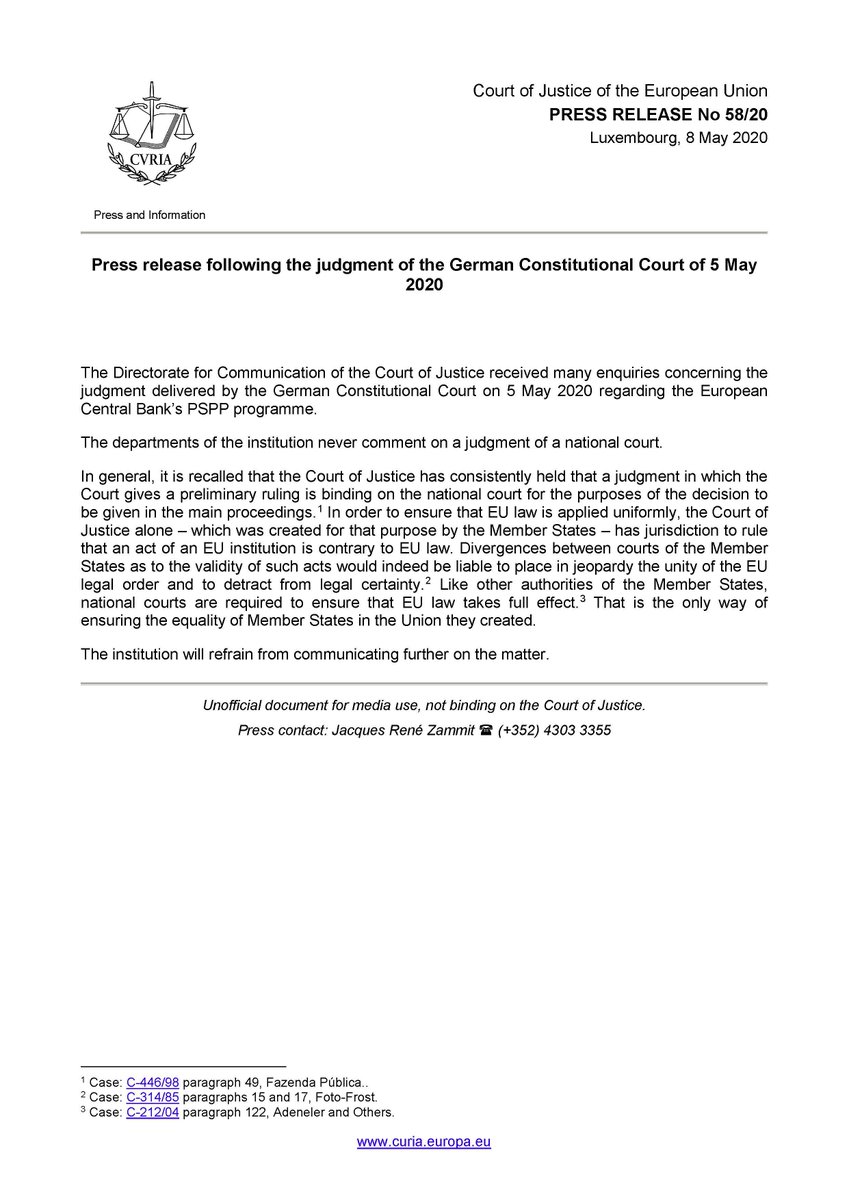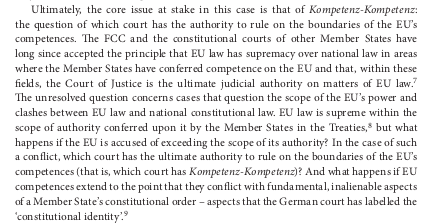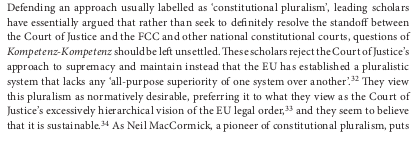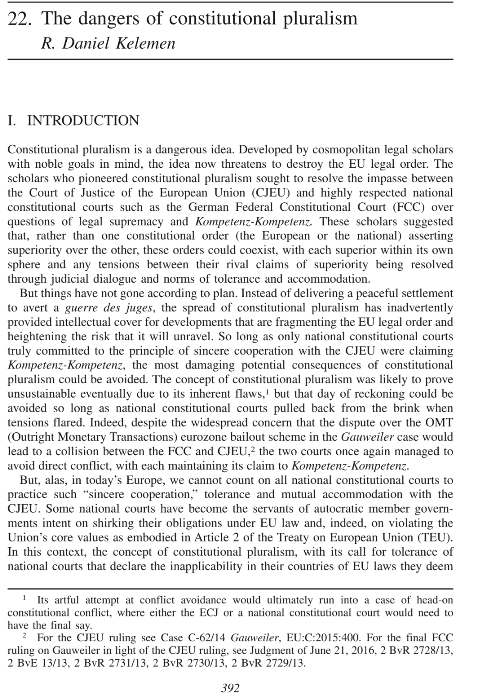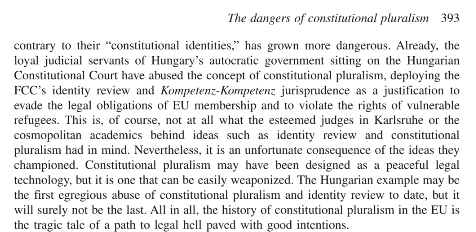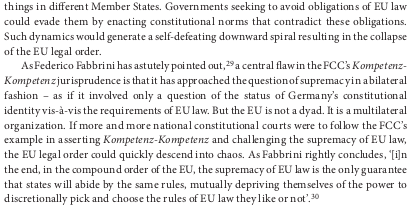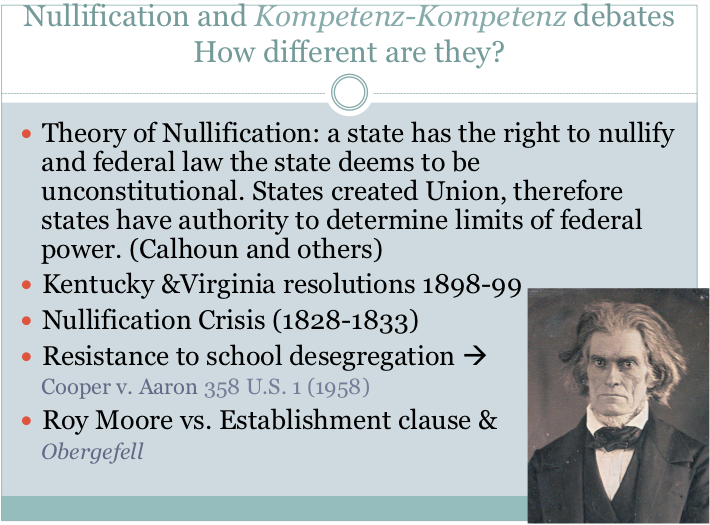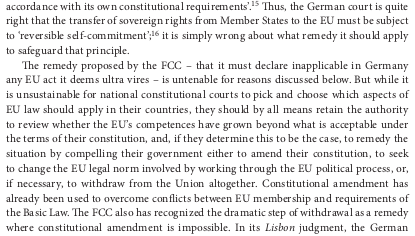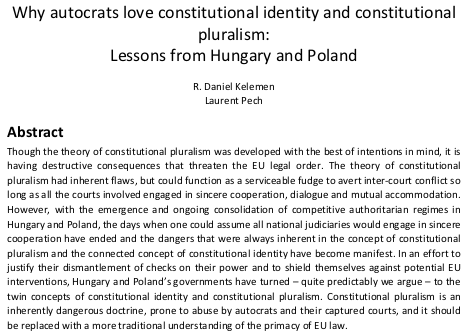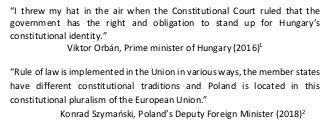1. A long  https://abs.twimg.com/emoji/v2/... draggable="false" alt="🧵" title="Thread" aria-label="Emoji: Thread"> on what is going on & what is at stake in dispute between @EUCourtPress & @EU_Commission & German @BVerfG. It is a showdown over question of "Kompetenz Kompetenz", & the survival of EU legal order is at stake. The ECJ is right & BVerfG& #39;s position is untenable https://twitter.com/MamerEric/status/1259520868801286146">https://twitter.com/MamerEric...
https://abs.twimg.com/emoji/v2/... draggable="false" alt="🧵" title="Thread" aria-label="Emoji: Thread"> on what is going on & what is at stake in dispute between @EUCourtPress & @EU_Commission & German @BVerfG. It is a showdown over question of "Kompetenz Kompetenz", & the survival of EU legal order is at stake. The ECJ is right & BVerfG& #39;s position is untenable https://twitter.com/MamerEric/status/1259520868801286146">https://twitter.com/MamerEric...
2. First a quick reminder of most recent developments...a few days ago Germany& #39;s constitutional court @BVerfG issued a ruling concerning German participation in @ecb QE programs, in which it blatantly rejected an ECJ ruling. Here was my take w/ Fabbrini https://twitter.com/rdanielkelemen/status/1258523252902658049?s=20">https://twitter.com/rdanielke...
3. The @EUCourtPress reacted with a highly unusual press release, not commenting on the case explicitly, but reminding everyone that its rulings are binding on national courts & that the ECJ alone has authority to rule on whether EU institutions& #39; actions violate EU law
4. Today President @vonderleyen issued a statement on the case backing up the ECJ, saying, "The final word on EU law is always spoken in Luxembourg. Nowhere else." & suggesting @EU_Commission might bring an infringement action against Germany https://ec.europa.eu/commission/presscorner/detail/en/statement_20_846">https://ec.europa.eu/commissio...
5. To understand what is at stake, we need to back up and consider 1) a long-running dispute between the ECJ & the German court, 2) a related academic debate about & #39;constitutional pluralism& #39;, & 3) how autocrats will make use of the German court& #39;s ruling
6. Core issue in dispute concerns which court- @EUCourtPress or a nat& #39;l constitutional court (ie @BVerfG) - has authority to rule on boundaries of the EU& #39;s competences (so-called Kompetenz-Kompetenz). I wrote about it here & will share some quotes: https://journals.sagepub.com/doi/abs/10.1177/1023263X1602300108">https://journals.sagepub.com/doi/abs/1...
7. The German (and all national constitutional courts) accept that ECJ has primacy in ruling on matters of EU law, but the dispute is about what happens if the national court believes the EU has exceeded its competences & trod on to areas reserved to the member states.
8. ECJ & German FCC have long been at loggerheads on this issue. Each claims Kompetenz-Kompetenz, & in essence they have been talking past each other (engaging in "parallel play" as I refer to it in this paper) for decades. They had managed to avoid direct conflict, until now
9. Many scholars have addressed this unsettled state of affairs by arguing either that a) since question of ultimate supremacy is insoluble, both sides should accommodate this "constitutional pluralism", or b) in fact "pluralism" is normatively preferable to a hierarchical model
10. In essence they argue that neither legal order (EU or national) should assert superiority over the other, and that disputes over the boundaries of EU & national law should be resolved through dialogue, tolerance and mutual accommodation.
11. Sounds great right? Dialogue & accommodation are noble ideas. Problem is 1) it is an unsustainable fudge & a direct conflict was inevitable, & 2)it is prone to abuse by autocrats looking for excuse to ignore EU law. I wrote about latter 1st here: https://www.e-elgar.com/shop/gbp/research-handbook-on-legal-pluralism-and-eu-law-9781786433084.html">https://www.e-elgar.com/shop/gbp/...
12. I have great respect for the scholars in this tradition. Nevertheless, I think their vision for EU legal order is unsustainable & (see below) that their ideas are prone to abuse by autocrats & therefore dangerous. If EU legal order is to survive, ECJ& #39;s approach must prevail
13. I& #39;ve seen many defenses of constitutional pluralism from very smart scholars, but so far I have found all of them utterly unconvincing. Their defenses are nuanced and complicated, but the reason they are unconvincing is simple...
14. The problem has to do with the German Court& #39;s claim that it can rule any EU act (including an ECJ decision) that it deems to be outside the EU& #39;s competence (ultra vires) to be inapplicable in Germany. If national constitutional courts could do this, it would destroy the EU.
15. If 27 national constitutional courts could judge the scope of EU& #39;s competences in their countries, then EU law would mean different things in different countries - & so would mean nothing. States could pick & choose which EU laws to apply by amending constitutions
16. The @BVerfG& #39;s claim that it can declare EU acts it deems ultra vires to be inapplicable in Germany is nothing less than a "nullification doctrine" of the sort we& #39;ve seen in the US from pre-Civil war days (Calhoun) to quite recently (Roy Moore)
17. Some might protest saying, "But the EU isn& #39;t a federal state, so ECJ shouldn& #39;t have final say". But again, if national courts can nullify EU acts & ECJ decisions, then the EU legal order - the only thing that holds the EU together - will collapse.
18. Note: this doesn& #39;t mean states lose sovereignty or that nat& #39;l courts can& #39;t protect their constitutions. The issue is the remedy they apply: if they they think the ECJ has overstepped its bounds, they can& #39;t simply invalidate its rulings, but they can do other things....
19. Instead, they can a)tell their gov it must work through EU political process to change the offending law, b) amend their constitution, or c) tell gov it must leave EU if things don& #39;t change. If you think leaving is impossible, ask the UK. (It is a stupid idea, but possible)
20. Finally, we must consider the current context & how the EU& #39;s pet autocrats in Hungary & Poland will make use of the @BVerfG ruling. I wrote about this most recently with @ProfPech: https://www.cambridge.org/core/journals/cambridge-yearbook-of-european-legal-studies/article/uses-and-abuses-of-constitutional-pluralism-undermining-the-rule-of-law-in-the-name-of-constitutional-identity-in-hungary-and-poland/3DCC6C466E4E3B97448337C0F701CA56">https://www.cambridge.org/core/jour...
21. The title of the working paper version of that article w/ @reconnectEU captures the problem best "Why autocrats love constitutional identity and constitutional pluralism: Lessons from Hungary and Poland" https://reconnect-europe.eu/wp-content/uploads/2018/10/RECONNECT-WorkingPaper2-Kelemen-Pech-LP-KO.pdf">https://reconnect-europe.eu/wp-conten...
22. In short, the autocracies of HU & PL & their captured courts are seizing on ideas promoted by the @BVerfG & pluralists to justify their defiance of EU law & the ECJ.
23. Of course, defenders of the German BVerfG & of constitutional pluralism are horrified to see how their ideas abused by regimes intent on destroying rule of law, but they tend to say that the fact an idea can be abused doesn& #39;t discredit the idea.
24. To me that& #39;s a bit like a "guns don& #39;t kill people, people do" argument. True to point, but obscures fact that the product (here an idea) is inherently dangerous & prone to abuse. @ProfPech & I warned captured courts in HU & PL would abuse these ideas, & now they are doing so
25. Predictably, the illegally appointed judges on Poland& #39;s captured & #39;Constitutional Tribunal& #39; have rushed to invoke the @BVerfG& #39;s ruling to claim they can overrule any ECJ rulings concerning the Polish government& #39;s assault on judicial independence https://twitter.com/ProfPech/status/1259499120064106504?s=20">https://twitter.com/ProfPech/...
26. What& #39;s good for the goose is good for the gander: if the esteemed judges of the @BVerfG can override the ECJ, then so will captured courts in autocratic states like HU & PL. And that, as my friend @Erik_Jones_SAIS often says, "is what European disintegration looks like"
27. To read more, I particularly recommend recent analyses of the German Court& #39;s ruling by scholars like @DanielSarmiento @prof_mayer @KatharinaPistor & @Erik_Jones_SAIS. Many good media takes too, ie https://www.ft.com/content/79484c01-b66b-4f81-bdc6-fd4def940821">https://www.ft.com/content/7... & https://twitter.com/VALERIEin140/status/1259473281620553728?s=20">https://twitter.com/VALERIEin...
28. To some, this may seem to some like an obscure legal battle, but particularly given the rise of autocratic member govs, it is really an existential battle for the EU. The EU is a union built on law. If its legal order fragments like this, it is in grave danger. END  https://abs.twimg.com/emoji/v2/... draggable="false" alt="🧵" title="Thread" aria-label="Emoji: Thread">
https://abs.twimg.com/emoji/v2/... draggable="false" alt="🧵" title="Thread" aria-label="Emoji: Thread">

 Read on Twitter
Read on Twitter